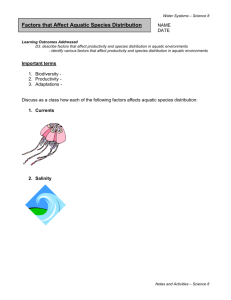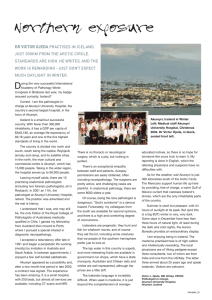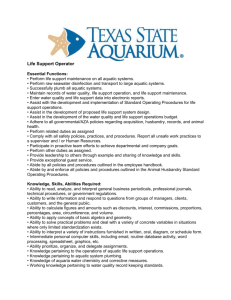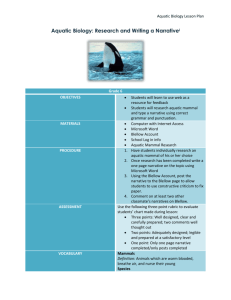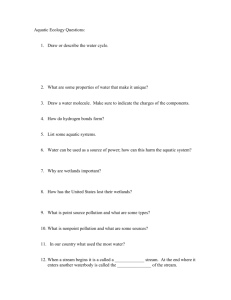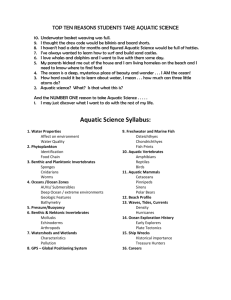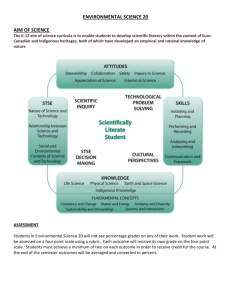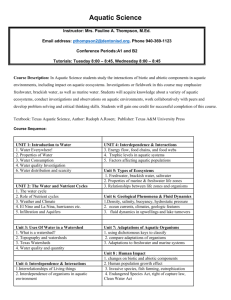NORDNATUR intensive course
advertisement
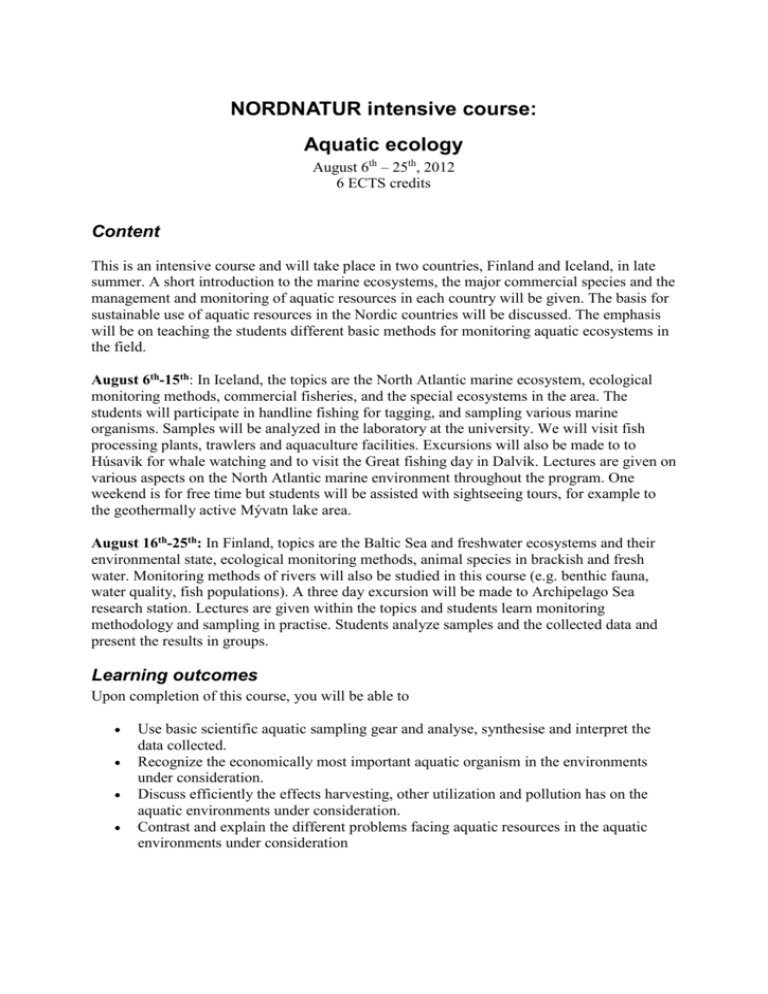
NORDNATUR intensive course: Aquatic ecology August 6th – 25th, 2012 6 ECTS credits Content This is an intensive course and will take place in two countries, Finland and Iceland, in late summer. A short introduction to the marine ecosystems, the major commercial species and the management and monitoring of aquatic resources in each country will be given. The basis for sustainable use of aquatic resources in the Nordic countries will be discussed. The emphasis will be on teaching the students different basic methods for monitoring aquatic ecosystems in the field. August 6th-15th: In Iceland, the topics are the North Atlantic marine ecosystem, ecological monitoring methods, commercial fisheries, and the special ecosystems in the area. The students will participate in handline fishing for tagging, and sampling various marine organisms. Samples will be analyzed in the laboratory at the university. We will visit fish processing plants, trawlers and aquaculture facilities. Excursions will also be made to to Húsavík for whale watching and to visit the Great fishing day in Dalvík. Lectures are given on various aspects on the North Atlantic marine environment throughout the program. One weekend is for free time but students will be assisted with sightseeing tours, for example to the geothermally active Mývatn lake area. August 16th-25th: In Finland, topics are the Baltic Sea and freshwater ecosystems and their environmental state, ecological monitoring methods, animal species in brackish and fresh water. Monitoring methods of rivers will also be studied in this course (e.g. benthic fauna, water quality, fish populations). A three day excursion will be made to Archipelago Sea research station. Lectures are given within the topics and students learn monitoring methodology and sampling in practise. Students analyze samples and the collected data and present the results in groups. Learning outcomes Upon completion of this course, you will be able to Use basic scientific aquatic sampling gear and analyse, synthesise and interpret the data collected. Recognize the economically most important aquatic organism in the environments under consideration. Discuss efficiently the effects harvesting, other utilization and pollution has on the aquatic environments under consideration. Contrast and explain the different problems facing aquatic resources in the aquatic environments under consideration Important for students at the University of Akureyri Students in fisheries sciences at the University of Akureyri can attend this course instead of marine biology (SJL1103). Description This is an intensive course and will take place in two countries, Finland and Iceland, in late summer. A short introduction to the marine ecosystems, the major commercial species and the management and monitoring of aquatic resources in each country will be given. The basis for sustainable use of aquatic resources in the Nordic countries will be discussed. The emphasis will be on teaching the students different basic methods for monitoring aquatic ecosystems in the field. Evaluation Grading from 1,0 to 10,0 at 0,5 intervals, minimum of 5,0 to pass, according to the Icelandic grading system. Evaluation is based on the presentations (20% Finland and 20% Iceland) and final report (60%). Administration This course is part of the fall semester at the University of Akureyri and grades will be given at the end of the term in December. Students will receive transcript of records. Special arrangements can be made for students at universities that have different semester structure. Sending NORDNATUR-partners are approving the course as part of the students' education program. Costs Course is covering transportation during the course activities, lodging and educational material. Students have to cover the travelling expenses to Akureyri where the course starts and from Turku where the course ends as well as for food and entrance fees for museums related to the course study and for whale watching trip. Students will be helped with booking flights if needed. Accommodation will be simple, and you will have to bring your sleeping bag. Students are recommended to have own laptops during the course. Application and contacts Application deadline is on April 9th 2012. Selection of students will be based on quotas: University of Akureyri and Turku University of Applied Sciences will have 4 students each and all other Nordnatur partners total of 7. Totally 15 students will be able to attend this course. Applications should be sent by mail to Arto Huhta, Turku University of Applied Sciences arto.huhta@turkuamk.fi or Hreidar Thor Valtysson, University of Akureyri. hreidar@unak.is. Use the application form at the end of this document. Selection criteria of students: - Study years, 2nd & 3rd year students in environmental sciences or related study programmes - Progress in studies For more information, feel free to contact: Bjarni Eiriksson, University of Akureyri. bjarnie@unak.is Olli Loisa, Turku University of Applied Sciences. olli.loisa@turkuamk.fi Teaching material Web based Schedule (draft) 6th August Monday (Akureyri): Students arrive 7th August Tuesday (Akureyri): Welcome address, introduction, lectures (The aquatic environment) 8th August Wednesday (Ytri Vík): Lectures, field work (oceanography, fish tagging) 9th August Thursday (Ytri Vík): Lectures, field work (plankton and benthos, fish tagging 10th August Friday (Ytri Vík): Lectures, field work (fish tagging, mussel farming) 11th August Saturday (Ytri Vík): The great fishing day in Dalvík 12th August Sunday (Ytri Vík): Day off, sightseeing Lake Mývatn etc 13th August Monday (Ytri Vík): Lectures, Húsavík whale research 14th August Tuesday (Ytri Vík): Leave Akureyri, travel through the highlands 15th August Wednesday (Keflavík): Travel Iceland -> Finland 16th August Thursday: (Parainen)Lectures, excursion and boat trip Archipelago Sea starts 17th August Friday: (Seili Research station) Lectures, field work (Baltic Sea ecosystem) 18th August Saturday: (Seili Research station) Field work (water, fish and benthic sampling) 19th August Sunday: (Parainen) Day off, Turku sightseeing possibility 20th August Monday:(Parainen) Lectures, field work (limnology, environmental monitoring) 21th August Tuesday:(Parainen)Lectures, field work (commercial fisheries, electrofishing) 22th August Wednesday:(Parainen)Lectures, laboratory work on samples collected 23th August Thursday:(Parainen) Laboratory work and preparation of presentations and reports 24th August Friday:(Parainen) Group presentations, final dinner and sauna 25th August Saturday:(Parainen) Home Application for NORDNATUR short course: Aquatic ecology. 6 ECTS credits. August 6-25, 2012 Application deadline April 9th, 2012. Copy/mail to: Arto Huhta arto.huhta@turkuamk.fi or Hreidar Thor Valtysson hreidar@unak.is Date: STUDENT INFORMATION Name First name Surname Male Birth date Female Citizenship Student number Personal number e-mail address Cell phone nr Home address Street Postal code and city Country Telephone University/institution Name Faculty City Country I am studying Degree program Year of study Contact person at your institution First name Surname e-mail REMARKS, special needs
